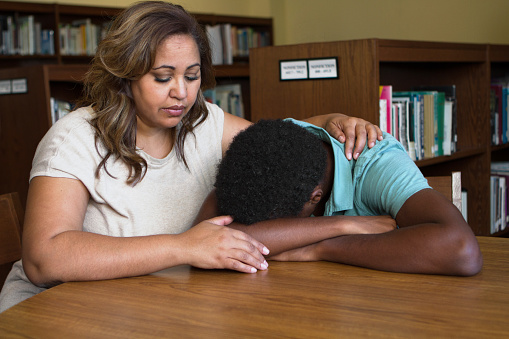Having a child with bipolar disorder may bring up concerns and fear. You may be wondering how you will manage caring for your child. These feelings are normal, and you are not alone. In years past the onset of bipolar did not occur until approximately 25 years of age, but bipolar in adolescence is becoming more common.
Bipolar is a mental condition marked by alternating periods of elation and depression. There are two types of symptoms:
1) Manic episodes
Mood swings that consist of excessive highs and depressive lows. Symptoms are increased activity, energy, or agitation. An exaggerated sense of well-being, self-confidence or euphoria.
2) Depressive episodes
Feelings of profound sadness or hopelessness. Fatigue, loss of energy, sleeping too much, and extended periods of depression. A loss of interest in previously enjoyed activities.
“God is our refuge and strength, an ever-present help in trouble. Therefore, we will not fear.” Psalm 46:1 (NIV)
Here are some tips of how to care for your child with bipolar disorder:
1) Open communication
Let your child talk about their day. It helps them sort through their thoughts.
2) Educate your child’s teacher about bipolar disorder
They can adjust expectations to help decrease your child’s stress level.
3) Flexibility
Side effects from medications, visits with health professionals, and symptomatic days may cause them to miss scheduled events. Support them and show them grace.
4) A consistent schedule
Dependable events on the same day each week gives them something to look forward to. It adds stability to their life.
5) Minimize distractions in group settings
Distractions can cause disruptive behaviors and affect your child’s ability to focus.
6) Good communication
Keep teachers and church leaders aware of changes in mental well-being. Watch for behavioral changes or signs of suicidal thoughts. These signs should be taken seriously, and a plan in place for how to respond in such situations.
Treatment for bipolar is a marathon, not a sprint. Trust your instincts and be an advocate for your child. With proper guidance, your child can develop strong qualities of empathy, creativity and resilience.
Caring for a child with bipolar can be stressful. Self-care is important for you and your family.
Here are some suggestions:
1) Slow the pace of your life
Make the choice to slow down and focus on your relationship with God and your family.
2) Practice gratitude
Each day, journal a few things you are grateful for. Thank God for his blessings.
3) Sleep
Everyone benefits from a good night’s sleep.
4) Exercise
Physical activity increases relaxation and decreases stress.
5) Healthy nutrition
A healthy diet helps calm a stressed mind.
6) Drink water
Our brains are 80% water. Dehydration affects our thoughts.
7) Listen to music
Music activates most regions of the brain. Add some dancing. Make it fun.
Pray for your child:
“Lord, I come to you in prayer for my child who suffers from bipolar. You know they struggle with cycles of depression and mania. Equip them to make wise choices during stressful times and keep them safe. Give me empathy and words to say for encouragement. May they sense your presence and know you are always with them and love them. Thank you for my child. In Jesus name, Amen.”
If you would like to hear more about this topic, CLICK HERE
Author
-

Amy Kendall is the Next Gen Disabilities and Mental Health Pastor at Saddleback Church and has been on staff there since 2007. Before working at Saddleback, she worked for 10 years in the educational sector as a behavior specialist, specializing with children on the autism spectrum. Amy graduated from Pacific Christian College with her BA in Ministry and from Hope International University with her MA in Marriage, Family, Child Counseling. Amy was recently on the board of the Disability Ministry Conference as their vice president and speaks often in regards to disability ministry. Amy also has a teenage son with multiple disabilities and mental health struggles and believes that she is a better pastor because she gets the blessing to be his mom.






